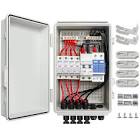Things Every Solar User Should Look Out for in Their Solar Setup & How to Maintain It
Investing in a solar system is one of the smartest decisions you can make. But here’s the truth—owning a solar setup isn’t a “fix it and forget it” solution. Just like your car, your solar system needs care, attention, and the right usage practices to serve you well and last long.
As a solar professional, here are some key things you should always look out for and practical tips to maintain your system:
1. Monitor Your Battery Health
Your batteries are the “heart” of your solar system. They store energy for when the sun isn’t shining.
- Check charging levels regularly on your inverter display or monitoring app. Avoid deep discharges (letting your battery drain below 20%)—this drastically shortens lifespan.
- Look for swelling, corrosion, or unusual heat around the battery terminals. These are early warning signs of damage.
- If you’re using lead-acid batteries, check the water levels monthly and top up with distilled water only.
🔑 Tip: Always size your battery bank correctly to your load. Overloading batteries is one of the fastest ways to kill them.
2. Keep Your Solar Panels Clean & Unshaded
Panels perform best when they’re clean and exposed to full sunlight.
- Clean your panels at least once every 2–4 weeks, depending on your environment. Dust, bird droppings, or leaves can reduce efficiency by up to 30%.
- Use a soft cloth, mild soap, and clean water. Avoid harsh detergents or abrasive materials.
- Check if nearby trees or new structures are casting shadows—partial shading can drastically reduce power output.
🔑 Tip: Morning or evening is the best time to clean panels, never under hot sun, to avoid cracking due to sudden temperature change.
3. Watch Your Inverter Closely
Your inverter is the brain of your solar setup.
- Always listen for unusual noises—humming, clicking, or beeping could indicate a problem.
- Check the screen or indicator lights for warnings or error codes.
- Ensure the inverter is installed in a cool, ventilated place. Overheating reduces efficiency and shortens lifespan.
🔑 Tip: If your inverter keeps switching off, it’s either overloaded, overheating, or your batteries are weak. Don’t ignore it—get it checked.
4. Manage Your Load Wisely
Solar is powerful, but it isn’t unlimited.
- Know the capacity of your inverter and batteries. Don’t run heavy appliances like electric irons, heaters, or air conditioners unless your system is sized for them.
- Spread your usage—don’t run all appliances at once.
- Switch off appliances when not in use. Even small “phantom loads” (like chargers plugged in but not charging) add up.
🔑 Tip: A system designed for lights, fans, and TV should not be stressed with freezers or pumping machines unless it was sized for them.
5. Regular Professional Check-Ups
No matter how careful you are, some issues need a professional eye.
- Schedule routine inspections every 6–12 months with your solar installer.
- A good technician will check cable connections, tightening loose joints, inspecting fuses, breakers, and earthing systems.
- Preventive maintenance is always cheaper than emergency repairs.
6. Protect Your System from Power Surges
Even with solar, many homes still connect to the grid. Sudden spikes from PHCN/NEPA or generators can damage your inverter.
- Always install a surge protector or MCB (miniature circuit breaker).
- If you use a generator, ensure it has a stable output before connecting to your solar inverter.
7. Keep Records of Performance
- Note your daily usage patterns, battery run-time, and charging time.
- If you notice a drop in performance (e.g., batteries not lasting as long as before), that’s your early signal to investigate before bigger problems arise.
Final Thoughts
A well-installed solar system should serve you faithfully for years. But remember, performance and lifespan depend on how well you care for it. Regular cleaning, smart load management, and periodic professional servicing will save you money and stress in the long run.
If you follow these tips, you won’t just be using solar—you’ll be enjoying solar at its best.







